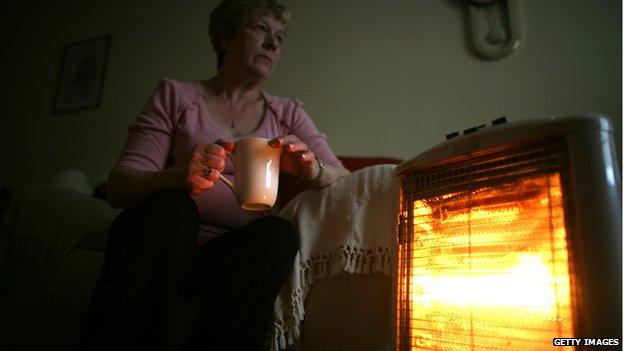Half of fuel-poor households in work, Policy Exchange says
- Published

More than half of those defined as being in fuel poverty in England are actually in work, a report has said.
The right-wing think tank Policy Exchange said 1.1 million householders cannot afford to heat their homes, even though they have a job.
It wants, external energy efficiency subsidies to be targeted more effectively.
However, the government said the number of people in fuel poverty was already falling, and it was spending more than ever before on keeping people warm.
The report's author, Richard Howard, said: "The facts paint a startling picture. There are over one million working households struggling to afford their energy bills, and living in under-heated homes."
The latest government figures show that 2.28 million people in England were living in fuel poverty in 2012, a 5% fall on the previous year.
The criteria for fuel poverty in England is now based on whether heating a home to a decent standard would leave the householder below the poverty line.
Scotland, Wales and Northern Ireland define it according to whether a household needs to spend more than 10% of its income on fuel.
Energy efficiency
Policy Exchange said the problem was most severe in older detached homes, which are off the national grid and tend to be in rural areas.
It claimed the government was spending less than half of what was required to make the affected homes energy efficient.
The report said energy efficiency subsidies - such as the Energy Company Obligation (ECO) - could be better focused on the poorest households.
It suggested that people claiming the Winter Fuel Payment should have to opt in to it.
The money saved could be put into further energy efficiency measures.
The government said it had already invested more than half a billion pounds in energy efficiency schemes, including £310m on the Warm Home Discount Scheme.
"Fuel poverty has fallen year on year under this government, and we're spending more than ever before to ensure more people stay warm this winter," said a spokesperson for the Department of Energy and Climate Change.
However, the government's own figures, external suggest that the number of English households in fuel poverty was expected to have increased to 2.33 million in 2014.